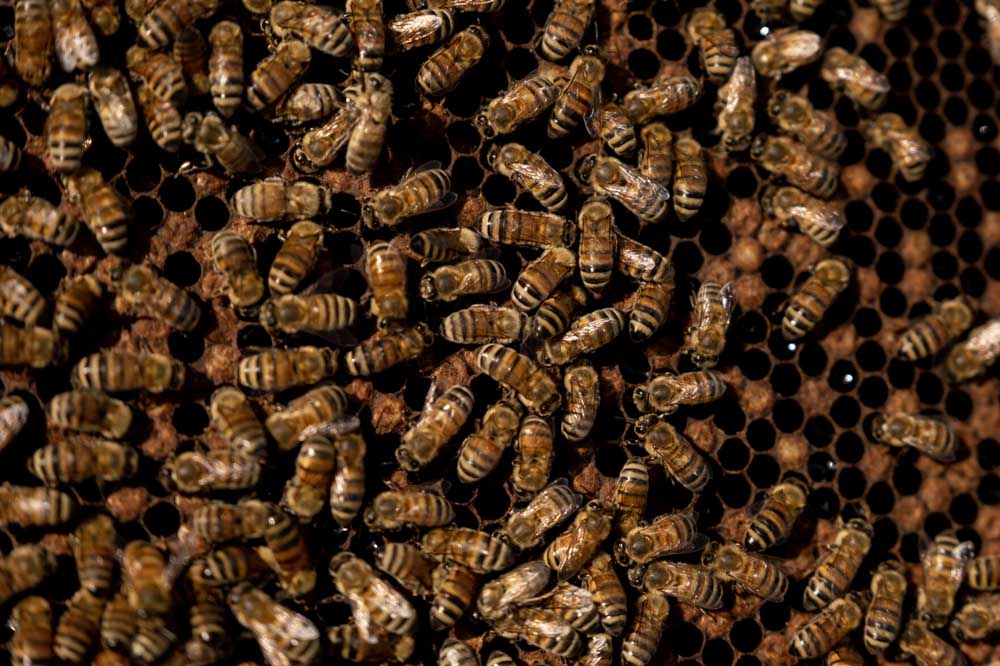Raising bees can give Texas landowners a tax break
Published 5:45 am Friday, January 17, 2025

- Isaac and Meagan Elzner check on a hive of bees, on May 31, 2023, at Elzner Farms in Jacksonville. (Michael Cavazos/ETX View Photo)
In Texas, where the landscape hums with the busy work of bees, property owners can lower their taxes by inviting nature’s most exquisite chemists to their land. The incentive, which began with legislation aimed at benefiting small-acreage landowners, allows them to qualify for agricultural property tax valuations by raising bees.
“Basically, having bees on your property changes its taxable valuation,” said Michael Kelling, President of the Central Texas Beekeepers Association. “It does not eliminate the tax, but moves it to an agricultural valuation rather than full tax.”
To qualify, the land must be between 5 and 20 acres, with six to 12 hives in proportion to the number of acres. Additionally, landowners must have been qualified for an agricultural valuation for at least five years before the tax incentive takes effect.
“Each county sets its own rules beyond that, so there is no common factor other than those mentioned,” Kelling added.
This tax break, similar to those offered for livestock or hay, presents an opportunity for property owners to reduce taxes while supporting nature’s tiny yet vital pollinators.
Dennis Herbert, a seasoned beekeeper from Bell County with 27 years of experience, was the driving force behind the legislation that allowed small-acreage landowners to qualify for agricultural property tax valuations by raising bees. He drafted the original bill, successfully guiding it through the Texas legislature in 2011, and it became law on Jan. 1, 2012.
Since then, the number of beekeeping operations in Texas has seen significant growth. According to an article in the Texas Tribune, the number of beekeeping operations increased from 1,851 in 2012 to 8,939 in 2022, largely due to the ‘bee bill.’
However, tax incentives are not the only factor motivating people to keep bees. Many are drawn to beekeeping because of a love for nature, the challenge of managing colonies, and the rewards of honey.
“Beyond tax incentives, the landowner should have a better garden, more flowers, and will be benefiting our natural world,” Kelling noted.
Many beekeepers are also motivated by the environmental impact, such as supporting local ecosystems through pollination.
“You can either keep bees yourself or hire someone to place beehives on your property,” Kelling said. “It depends on your interests and abilities; however, doing it yourself is a wonderfully rewarding experience.”
Kelling’s own journey in beekeeping began when he moved to Brenham in 2004. He resumed beekeeping in 2005, and by that time, the Central Texas Beekeepers Association was holding meetings every three months. The meetings, which typically drew around 15 attendees, began to suffer from poor attendance due to a lack of formal notices. The situation worsened when the group’s leader moved to East Texas, leaving only three members.
“We decided that we should either disband or push forward,” Kelling said. “We decided to give it one last try, so we had an educational meeting that was open to the public. There were 30 folks at the meeting, so we felt there was enough interest to continue.”
The club’s growth reflects the broader interest in beekeeping sparked by the tax incentive. In fact, Kelling’s efforts culminated in the successful Annual Beginning Beekeeping School, which has grown from a handful of attendees to a major event that now attracts hundreds of people.
“In 2010, there were 10 bee clubs in Texas,” Kelling said. “Today, there are around 60 clubs. For our own club growth, we were up to 125 folks attending our club meetings every month before COVID.”
The beekeeping club educates people about the incentive primarily through classes at the bee school and regular club meetings, along with offering one-on-one assistance to individuals who call with questions each month.
For many landowners, raising bees offers a unique opportunity to reduce property taxes while supporting local ecosystems. Whether driven by financial incentives, a love for nature, or tradition, beekeeping is becoming a cornerstone of Texas’ agricultural landscape. According to Kelling, 75 years ago, most families had a beehive or two, providing something sweet for themselves, reflecting the deep agricultural roots of beekeeping.
“I have a photo of my father as a young man suited up and working a beehive in Washington County,” Kelling said. “My hope is that this will become a more common hobby both for a family activity and for the benefit of the bees.”






